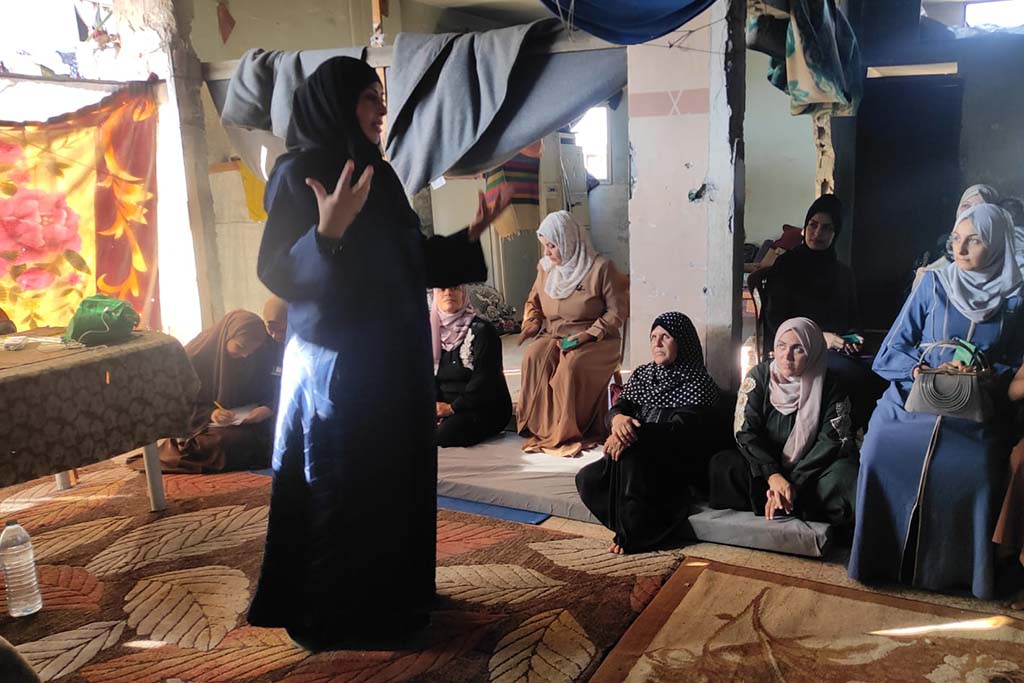The humanitarian crisis in Gaza affects women and children the hardest—this is how our partners are working on the ground
The humanitarian crisis in Gaza continues to worsen. Women and children are suffering from acute malnutrition and are exposed to brutal violence and constant insecurity. The Kvinna till Kvinna Foundation’s partner organisation Women’s Affairs Center continues its tireless efforts to reach the most vulnerable.

Since 7 October 2023, people in Gaza have been living in the midst of a humanitarian catastrophe. Israel’s brutal attacks, repeated displacement orders and continued blockade of humanitarian aid have triggered an immense crisis. During the ongoing genocide, 1.9 million Palestinians have been displaced—many of them more than once.
Women and children are especially at risk. According to UNICEF, 71,000 children and more than 17,000 women are suffering from acute malnutrition. These dire living conditions not only have immediate effects, but also increase the risk of long-term health impacts. The lack of security and the destroyed infrastructure prevent women and children from accessing healthcare, food, or safety.
Women and girls especially at risk
Women’s Affairs Center (WAC), one of Kvinna till Kvinna’s partner organisations, together with UNFPA, reports that women and girls in Gaza are particularly hard hit. Many lack privacy in the overcrowded refugee camps and face serious difficulties accessing basic supplies and healthcare. Almost all the women that WAC has been in contact with report feeling unsafe—both for themselves and for their families.
“The crisis is deepening existing gender inequalities and disproportionately affecting those with intersecting vulnerabilities—like women heads of households, adolescent girls, older women, and those with disabilities and cancer patients,” says staff from WAC.
Many women testify that violence against women has increased significantly since the onset of the war. Psychological and economic violence are the most common, but physical and sexual violence are also reported. The violence takes place in the overcrowded camps, and the perpetrators are often family members—but also aid workers and shelter officials.
Continuing their work despite insecurity and lack of resources
Despite the humanitarian crisis, WAC has managed to continue its work. By adapting their methods to the security situation, the organisation has been able to reach women and children with life-saving support. They provide emergency assistance while also working to prevent gender-based violence and reduce the risks associated with displacement. WAC is present in western Gaza, Deir Al Balah and Khan Younis—both through fixed safe spaces and mobile teams that reach women where they are located.
The organisation provides support ranging from hygiene kits, financial aid and psychosocial counselling to legal advice, referrals to healthcare, cancer rehabilitation and assistive devices for persons with disabilities. Although its operations are severely limited by Israel’s blockade, WAC is still able to secure some supplies.
“Supplies can still be purchased, but at high prices due to the shortage of goods in local markets. As for medicine and health services, we refer our cases to the American College Health Association, which provides health diagnoses and treatment, including medications, as they are able to procure or receive medicine and micronutrients through international organisations,” says staff from WAC.
Kvinna till Kvinna’s emergency fund has made a difference
WAC places strong emphasis on providing psychosocial support and has 63 staff members in its psychosocial team, the majority of whom are trained psychologists. They offer counselling both at their own centres and through mobile teams. In addition to supporting vulnerable women and girls, they also provide regular mental health support to their own staff—who themselves live within the humanitarian crisis—to prevent stress, burnout and psychological distress.
Thanks to the support from Kvinna till Kvinna’s emergency fund, WAC has been able to quickly respond to both immediate and long-term needs among women and girls. So far, they have:
- distributed hygiene kits to 55 girls, including shampoo, sanitary pads and underwear.
• provided more than 300 individual counselling sessions to 100 girls, helping them process crisis, stress and anxiety.
• gathered more than 560 girls at different locations in Gaza for group psychological first aid sessions.
• organised eight days of group activities for young women and girls to strengthen self-esteem and build community.
• held 22 workshops with 550 women and girls who participated in discussions about violence against women, children’s rights, health and hygiene.
For security reasons, we are protecting the identities of WAC’s staff members.